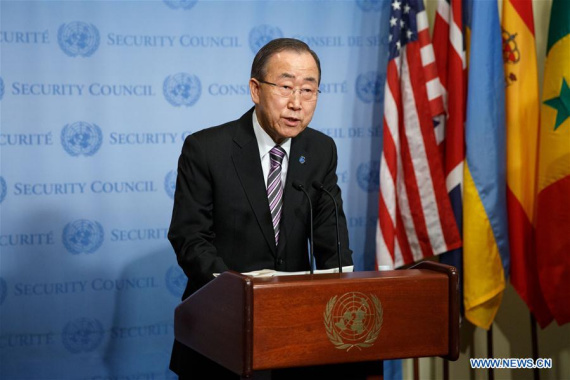
The United Nations Secretary-General Ban Ki-moon speaks to journalists on the Democratic People's Republic of Korea (DPRK)'s announcement of first hydrogen bomb test, at the UN headquarters in New York, the United States, Jan. 6, 2016. UN chief condemns unequivocally DPRK over hydrogen bomb test. (Photo: Xinhua/Li Muzi)
UN Secretary-General Ban Ki-moon on Wednesday called the nuclear test conducted by the Democratic People's Republic of Korea (DPRK) "deeply troubling (and) profoundly destabilizing" and members of the Security Council called the test "a clear threat to international peace and security" after an urgent meeting.
The 15-nation council, the only UN body that makes a legally biding decision, threatened additional action against Pyongyang.
"The underground nuclear test announced ... is deeply troubling," the secretary-general told reporters outside the council's chambers.
"This test once again violates numerous Security Council resolutions despite the united call by the international community to cease such activities," Ban said. "It is also a grave contravention of the international norm against nuclear testing."
"This act is profoundly destabilizing for regional security and seriously undermines international non-proliferation efforts," he said. "I condemn it unequivocally."
"I demand the DPRK cease any further nuclear activities and meet its obligations for verifiable denuclearization," the UN chief added.
Also on Wednesday, the UN Security Council "strongly" condemned the nuclear test after the Council convened an emergency closed-door meeting on the DPRK.
"Members of the Security Council strongly condemned this test ... and of the non-proliferation regime, and therefore a clear threat to international peace and security continues to exist," said this month's Security Council President Elbio Rosselli, permanent representative of Uruguay.
"Members of the Security Council also recalled that they have previously expressed their determination to take 'further significant measures' in the event of another DPRK nuclear test, and in line with this commitment and the gravity of this violation, the members of the Security Council will begin to work immediately on such measures in a new Security Council resolution," he said in a brief statement.
Ban said UN leadership was "monitoring and assessing developments in close coordination with the concerned international organizations -- including the Comprehensive Nuclear-Test-Ban Treaty Organization (CTBTO) and interested parties."
The Wednesday announcement by the DPRK that it successfully carried out its first hydrogen bomb test earlier in the day jolted the international community, as the move threatens to dampen the denuclearization process on the Korean Peninsula and tenuous regional stability.
The H-bomb test is the fourth nuclear test by the country, which has previously conducted three nuclear tests in 2006, 2009 and 2013 respectively. The DPRK has been under sanctions for its nuclear weapon program since its first test in 2006.
Speaking by telephone to reporters at UN Headquarters from the CTBTO headquarters in Vienna, Lassina Zerbo, the executive secretary of the CTBTO, said the test announcement was a "not very good start" to the new year. "Now we need the smoking gun."
The organization has yet to confirm it was a manmade event registering on seismic monitors, he said. Air monitors also have yet to pick up evidence of "radio isotope venting," indicating a nuclear device. It took 53 days to detect such venting from the 2013 test.
However, despite Pyongyang's claim that it had tested a hydrogen device, he said the data from monitoring stations could not confirm that at the moment, and early evidence indicates the strength of the seismic event was slightly less than it would be if it were a hydrogen blast.
Noting progression in strengths of DPRK past tests, Zerbo said that "if they do more they will be able to master the technology."
"The point is for us is to put an end to nuclear testing, not only on the Korean peninsula but nowhere in the world should we have a nuclear test explosion again. The 21st Century is too civilized to allow nuclear test explosions," he said.


















































